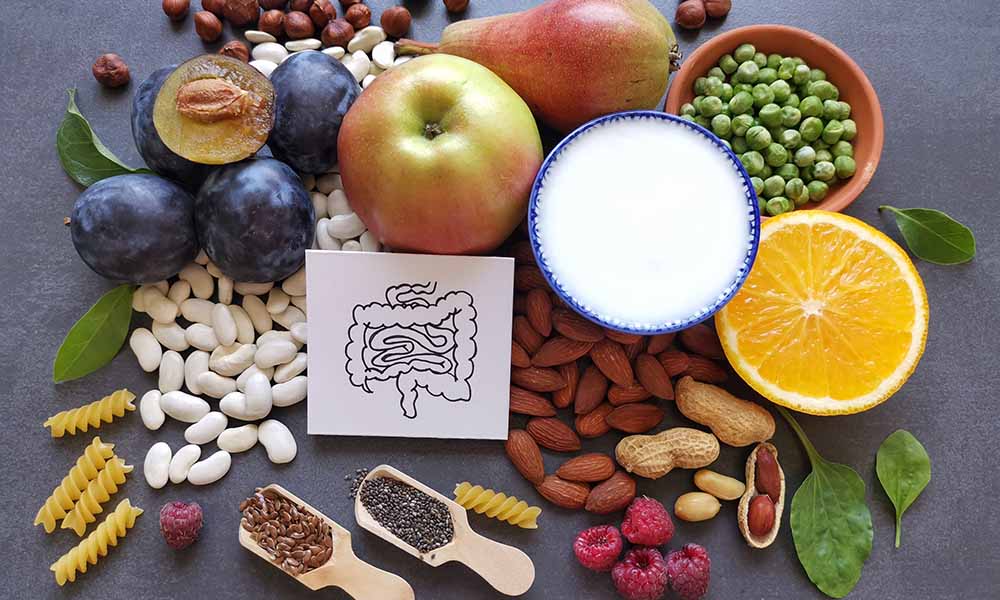8 Easy Tips to Maintain a Healthy Digestive System

Your digestive system is responsible for more than just breaking down the food you eat. From nutrient absorption to waste elimination and energy production, a healthy food digestive system helps maintain your overall well-being.
But sometimes things can go wrong with your gut, affecting your general health. You might experience bloating, heaviness, flatulence, gurgling, or other gastric disorders, making it difficult for you to function normally. When dealing with such gastrointestinal issues, you might be unsure where to start to ensure the proper functioning of your digestive system.
In this article, we will discuss some top gastroenterology tips to take care of your digestive system and ensure its wellness.
Understanding Digestive Health: What is it and Why it Matters?
Digestive health is a critical aspect of your overall well-being, which depends on the proper functioning of your gastrointestinal (GI) tract, which includes organs such as the stomach, intestines, liver, and pancreas.
Wondering why digestive health matters?
A healthy digestive system efficiently processes and breaks down the food you consume. Furthermore, it plays a key role in absorbing nutrients, providing energy, eliminating food, and supporting bodily functions.
If you neglect your digestive system stomach, you might suffer from various issues, including nutrient deficiencies, weakened immunity, bloating, and chronic diseases, such as Crohn’s disease or inflammatory bowel syndrome.
Taking care of your gastrointestinal health will not only help prevent these long-term issues and discomfort but also help maintain optimal overall health and vitality.
Common Digestive Problems
Ignoring your digestive health can lead to mild discomfort and in worst cases, various severe stomach digestion problems:
Constipation and Diarrhea: Characterised by infrequent bowel movements or difficulty passing stools, constipation is usually caused by a lack of fibre or hydration. On the other hand, diarrhoea can result from infections, gastrointestinal disorders, or food intolerances.
Heartburn and Acid Reflux: These two common gastrointestinal conditions occur when stomach acid flows back into the oesophagus, causing irritation, discomfort, and a burning sensation. If you are suffering frequently from acid reflux, you might experience severe problems like GERD (Gastroesophageal Reflux Disease).
Irritable Bowel Syndrome (IBS): A chronic disorder affecting the large intestine, irritable bowel syndrome is often caused by stress, changes in routine, or certain foods. If diagnosed with IBS, you are more likely to experience symptoms like cramping, abdominal pain, bloating, gas, diarrhoea or constipation.
Diverticular Disease: This disease occurs when small bulging pouches form in your digestive tract, which can become inflamed or infected.
Gastroenterology Tips for Maintaining Your Digestive Wellness
When it comes to maintaining your digestive health, many focus on maintaining a good diet for a healthy gut and improving their physical health. But there’s much more you can do to maintain optimal digestive health.
The following outlined are some effective tips you can follow to improve your gastrointestinal well-being:
Adopt a High-Fiber Diet
Gastroenterologists always recommend people with digestive issues adopt a fibre-rich diet to keep their digestive system regular. But a fibre-rich diet can do much more for your body, such as lowering your cholesterol levels, blood pressure, and weight.

Thinking about consuming how much fibre is good for your stomach? According to the Dietary Guidelines for Americans 2020–2025, women and men aged between 19 and 50 should have 25 to 28 grams of fibre and 31 to 34 grams of fibre, respectively.
A variety of fruits, vegetables, whole grains, legumes, and nuts are the most common food for better digestion. These foods are rich in fibre and can help regulate your bowel movements and prevent constipation.
Regular Physical Activity
Apart from diet and hydration, you should also indulge in physical activities to maintain optimal digestive health.
By engaging in exercise, you will not only lose weight but also boost the efficiency of your gastrointestinal tract, promoting regular bowel movements and reducing the risk of digestive issues. Even exercise is linked with reduced chances of GERD, most likely because of its contribution to weight management.
You should try to engage in moderate exercise for at least 30 minutes most days of the week to maintain a healthy weight, which in turn, can reduce the risk of digestive problems.

Stay Hydrated
Drinking plenty of water facilitates digestion by acting as a lubricant that helps food to move smoothly along the digestive tract. Moreover, water can also help soften stool, preventing constipation and promoting regular bowel movements.
If you are increasing your fibre intake, you should try to drink more water to avoid any bloating. Here are some tips following which you can maintain proper hydration:

Talking about figures, men and women should drink approximately 3.7 litres and 2.7 litres of fluids a day, respectively. The quantity can also be increased depending on how active you are, your climate, and your overall health.
If you can’t drink plain water, consider drinking sugar-free tea and herbal infusions.
Avoid having dehydrating beverages, such as caffeine and alcohol.
Consume water-rich fruits and vegetables, such as oranges, watermelon, cucumbers, and berries.
Eat Regularly and Mindfully
You should eat your meals and snacks throughout the day so that food can move smoothly through your digestive tract. Make sure to consume all three meals at regular intervals in a day for proper digestion.

But whenever you eat, be mindful of eating in a quiet setting and take at least 20 to 30 minutes to have each meal. Besides this, you should chew your food thoroughly before swallowing to prevent overeating and reduce digestive discomfort.
Go Easy on Spice
Many people’s digestive system is strong enough to tolerate spicy food. But the same is not the case with everyone. Some find their stomach getting upset whenever they consume spicy food.
If you are one of those, you should go easy on or completely avoid spicy foods. Furthermore, foods other than hot scorching chillies, such as onion, garlic, etc., can also cause heartburn, stomach pain or diarrhoea. So, you should avoid them.
Be Mindful of Air Intake
When you swallow air, it creates 90% of the gases in your digestive system. But consuming too much air can cause bloating. So, you need to be mindful of how much air you inhale.

But how to swallow less air? The below-given are some helpful tips:
Stop smoking
Avoid chewing hard candies and gum
Eat slowly and be relaxed during your meals
Drink from a glass, not with a straw or bottle
Prefer warm drinks, not hot ones
Manage Stress
Chronic stress can negatively impact the digestive system. When stressed, you might experience a feeling of uneasiness in your stomach. It happens because when anxious and worried, it might upset the delicate balance of digestion.
Sometimes, stress can slow down your digestion process, and cause diarrhoea, bloating, constipation, stomach ulcers, IBS, and pain too.

Therefore, living a stress-free life is key to ensuring optimal health of your digestive system. To beat your stress, consider incorporating relaxation techniques such as deep breathing, meditation, or yoga. Also, you can try talking about your feelings and emotions with your family, friends, or mental health professionals.
Stay Informed and Consult Professionals

When should you visit your gastroenterologist?
Do you frequently experience digestive problems, such as flatulence, bloating, acid reflux, constipation, blood in the stool, diarrhoea, etc.? If yes, consider visiting your doctor. Regular check-ups with a gastroenterologist can help detect potential issues early and provide personalised advice for maintaining digestive health.
Concluding Thoughts
Prioritising digestive health is fundamental to your overall well-being. By following the above-discussed tips, you can support your food digestive system and prevent common ailments.
Other than that, it’s advisable to consult your gastroenterologist when regularly suffering from digestive issues. Experienced gastroenterologists at Medanta can help detect and address potential digestive problems early, preventing your health from worsening.
FAQs
Q.1 What foods should I eat for better digestion?
You should consume high-fibre foods such as fruits, vegetables, whole grains, and legumes and fermented foods like yoghurt and kimchi to boost beneficial bacteria in your gut, aiding in digestion.
Q. 2 Can stress cause stomach digestion problems?
Yes, chronic stress can negatively impact your food digestive system by upsetting the delicate balance of digestion. You might suffer from problems like bloating, acid reflux, constipation, and irritable bowel syndrome (IBS).
Q.3 What foods should I avoid for optimal digestive health?
You should avoid highly processed foods, excessive sugar, fried foods, carbonated drinks, and artificial sweeteners, as these foods can disrupt your gut health and lead to digestive discomfort.
Q.4 How can I know if my digestive system is healthy or not?
If you experience symptoms like bloating, abdominal pain, constipation, diarrhoea, nausea, vomiting, and heartburn, it might indicate that your digestive system is unhealthy.
Q.5 What factors can damage my digestive health?
A highly stressed lifestyle, lack of sleep, illnesses, antibiotics, consuming highly processed foods and alcohol, and practising smoking can damage your digestive health.
Citations
Harvard Health Publishing - Foods high in fiber: Boost your health with fiber-rich foods
https://www.health.harvard.edu/nutrition/foods-high-in-fiber-boost-your-health-with-fiber-rich-foods
ResearchGate - Impact of physical activity on digestive system diseases
https://www.researchgate.net/publication/386090359_Impact_of_Physical_Activity_on_Digestive_System_Diseases
Brimingham Gastroenterology - Hydration and digestion: the link between water and gut health
https://bgapc.com/hydration-and-digestion-gut-health/
NHS - Good foods to help your digestion
Good foods to help your digestion - NHS
NHS - 5 lifestyle tips for a healthy tummy
https://www.nhs.uk/live-well/eat-well/digestive-health/five-lifestyle-tips-for-a-healthy-tummy/


